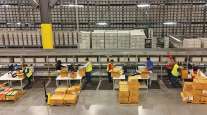Bloomberg News
Boeing to Offer Buyouts, Mull Output Cuts Amid ‘New Reality’

[Stay on top of transportation news: Get TTNews in your inbox.]
Boeing Co. is offering buyouts to its entire staff of 161,000 people and weighing new output reductions as the coronavirus pandemic threatens to depress aircraft sales for years.
The planemaker is considering another cut to wide-body production beyond what was already announced for the 787 Dreamliner, said a person familiar with the matter. Boeing is still assessing the rapidly changing market and public health issues as the outbreak guts travel demand and batters airlines.
“When the world emerges from the pandemic, the size of the commercial market and the types of products and services our customers want and need will likely be different,” CEO David Calhoun said in a message to employees April 2. “It’s important we start adjusting to our new reality now.”
The move will preserve much-needed cash at Boeing, which along with European rival Airbus SE is facing a sharp contraction in the jetliner market. Airlines around the world have slashed schedules and parked aircraft. About 44% of planes are in storage, according to data provider Cirium. And with global virus cases approaching 1 million, there’s no telling when carriers will return to normal schedules, much less start buying jets again.
“As painful as it is going to be, Boeing needs to reduce workers,” said Nick Cunningham, an analyst at Agency Partners based in London, adding that salaries make up the biggest portion of the company’s fixed costs. “If you don’t, you’ll destroy the company.”
Boeing climbed less than 1% to $131.65 at 9:35 a.m. in New York. The shares fell 60% this year through April 1, the biggest drop on the Dow Jones Industrial Average.
Factory Plans
For now, Boeing plans to reopen its Seattle-area factories next week, with workers reporting for an overnight shift that begins April 7. But that situation remains fluid and the decision to restart production in an epicenter for the coronavirus could be revisited, said the person familiar with the planning, who asked not to be identified as the discussions are confidential.
Boeing is changing procedures in its factories to protect workers from a virus that has already felled dozens of employees, with an emphasis on cleaning and maintaining physical distance between employees, the person said.
Calhoun told Boeing managers April 1 that he wants to make sure that Boeing is sized appropriately for the market tumult, while taking care not to damage the commercial division by cutting too deep, too early, said the person.
While Boeing’s sprawling defense division is relatively unchanged by the pandemic, Boeing’s services unit faces a tough outlook in the short term as cash-strapped airlines postpone aircraft maintenance and overhauls. Meanwhile, the jetliner business, Boeing’s largest, faces a difficult path to recovery, the person said.
The buyout is being offered to all eligible employees of Chicago-based Boeing. The company, the second-largest U.S. defense contractor and one of the nation’s biggest exporters, will provide information on the terms within four weeks.
“This move aims to reduce the need for other workforce actions,” Calhoun said.
Twin Crises
Boeing was already reeling from a prolonged grounding of its 737 Max when the coronavirus pandemic hit, with revenue and cash flow depleted. The disease has slowed work on recertifying the single-aisle workhorse, while clouding the outlook for sales once it returns.
The company is also facing a drop in demand for twin-aisle aircraft like its 787 Dreamliner and the coming 777X, as long-distance travel has been hit harder than shorter hops. Wide-body jetliner production could tumble by 60% over the next three years, Jefferies analyst Sheila Kahyaoglu predicted in a March 31 report.
The need to downsize has created a dilemma for Calhoun. Forced layoffs would give Boeing more control over where and how it cuts costs. But they would surely stir up a backlash that could complicate any effort by the manufacturer to access government aid.
While the company has told Congress that the industry needs some $60 billion, Calhoun has blanched at the strings that would potentially be attached.
Voluntary buyouts keep the government-assistance option viable, should Calhoun ultimately choose to pursue it. Boeing is analyzing the funding options available, people familiar with its review said last week.
As it pares back its staff, another challenge for Boeing will be maintaining essential skills that will be needed when the market bounces back, said Cunningham, the Agency Partners analyst. “But you have to actually survive as a company in order to come back again.”
Want more news? Listen to today's daily briefing:




